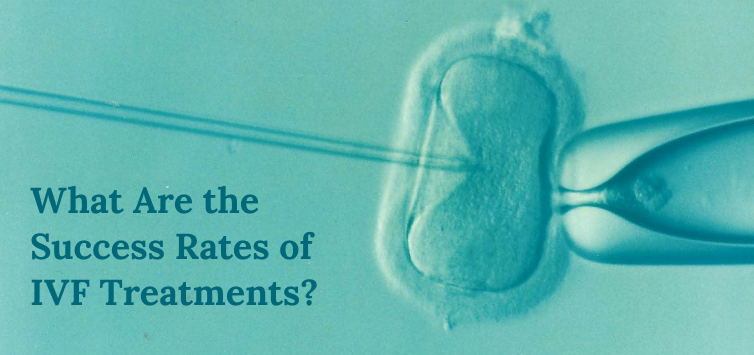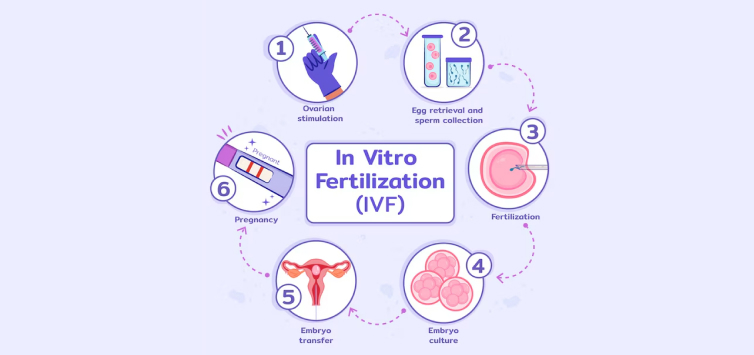Blog
Expert insights for your well-being journey. Your health is our priority.
What Are the Success Rates of IVF Treatments?
‘The path to parenthood through IVF procedure can come with both challenges and triumphs. By understanding success rates and the various influencing factors, you can make informed decisions and feel empowered throughout your IVF experience.’

In Vitro Fertilization (IVF) is a complex medical procedure that helps couples facing infertility issues conceive a child. This infertility treatment involves fertilizing an egg with sperm outside the body and then implanting the resulting embryo into the woman’s uterus for pregnancy. Understanding the success rates of IVF procedures is crucial for couples considering IVF, as it helps them make informed decisions and manage expectations.
Understanding IVF Success Rates
The success rates of IVF procedures are typically measured by live birth rates, meaning the percentage of cycles resulting in the delivery of a healthy baby. However, some clinics might report ongoing pregnancy rates, which include pregnancies that may not reach full term. It is important to understand the specific metrics used when comparing success rates between clinics or regions.
Factors Affecting IVF Success Rates

Several factors influence the success of an IVF procedure. Let’s explore them in detail.
- Age: This is the most significant factor. Younger women have a higher number of healthy eggs, hence, a greater chance of successful fertilization and implantation. Success rates decline with age due to a decrease in egg quality and quantity.
- Cause of Infertility: The underlying reason for infertility can impact outcomes. Conditions like blocked fallopian tubes may have better success rates compared to issues with egg or sperm quality. In such cases, the IVF process can bypass the blockage and facilitate fertilization.
- Quality of Eggs and Sperm: The health and viability of the eggs and sperm are crucial. Mature eggs with good morphology (shape) and motile sperm with healthy DNA are essential for successful fertilization and embryo development. Clinics may recommend tests to assess egg and sperm quality before proceeding with IVF.
- Number of Embryos Transferred: Transferring more embryos can increase the chances of pregnancy. However, this also raises the risk of multiples (twins, triplets), which can lead to complications for both mother and baby.
Doctors carefully consider factors such as age, embryo quality, and medical history when determining the optimal number of embryos to transfer. - Uterine Lining Health: A healthy uterine lining is essential for embryo implantation. The lining thickens and becomes receptive during the menstrual cycle to support a growing pregnancy. Factors like fibroids or polyps in the uterus can affect implantation. Doctors may recommend procedures to address these issues before transferring embryos.
- Lifestyle Habits: Maintaining a healthy weight, eating a balanced diet rich in nutrients, and avoiding smoking and excessive alcohol consumption can positively influence IVF success. These habits promote overall health and contribute to optimal egg and sperm quality.
- Clinic Experience and Lab Quality: Experienced clinics with advanced laboratory facilities often have higher success rates. This can be attributed to factors like:
- Established treatment protocols tailored to individual needs
- Experienced embryologists skilled in handling eggs, sperm, and embryos
- Latest technology for fertilization, embryo development, and evaluation
- Medical Conditions: Certain medical conditions in women like endometriosis, PCOS (Polycystic Ovary Syndrome), or primary ovarian insufficiency can reduce the number of viable eggs available for IVF. Managing these medical conditions before undergoing an IVF procedure can optimize the chances of success.
Success Rates by Age Group
Success rates decline steadily with age, primarily due to the diminishing quality and quantity of eggs. Here’s a general breakdown:
| Age | Live Birth Rate Per Cycle |
| Under 35 years | 44.5% |
| 35-27 years | 32.4% |
| 38-40 years | 20.2% |
| 41-42 years | 9.6% |
| Above 42 years | 2.9% |
Reference: Forbes
As a woman ages, eggs become less receptive to fertilization, and chromosomal abnormalities become more common.
Things to Consider for Successful IVF Treatment

1. Type of IVF Cycle:
A. Traditional IVF: It uses conventional fertilization methods, where eggs retrieved from the woman’s ovaries are mixed with sperm in a laboratory dish, allowing fertilization to occur naturally. This method is suitable for various infertility issues and is often the first choice for many couples undergoing IVF treatment.
B. Intracytoplasmic Sperm Injection (ICSI): In Intracytoplasmic Sperm Injection, a single sperm is injected directly into the egg to facilitate fertilization. This technique is particularly beneficial for couples dealing with male infertility problems such as low sperm count or poor sperm motility. ICSI can also be used when previous IVF attempts have failed or when sperm quality is a concern.
C. Donor Eggs: For women with diminished ovarian reserve or those unable to produce viable eggs, using donor eggs can offer a chance of pregnancy. Donor eggs are typically obtained from young, healthy women and fertilized with the partner’s or donor’s sperm through IVF. This option allows recipients to carry and give birth to a child genetically related to their partner.
D. Donor Sperm: In cases of severe male infertility, absence of sperm, or genetic concerns, donor sperm can be used to achieve pregnancy. Donor sperm is carefully screened for quality and may be selected based on specific criteria provided by the recipient couple. The sperm can then be used for conventional IVF or ICSI procedures to fertilize the partner’s or donor’s eggs.
2. Number of IVF Cycles: Success rates tend to increase with subsequent cycles, up to a certain point. This is because repeated attempts allow for the optimization of protocols and the selection of the most viable embryos.
3. Managing Expectations: It’s crucial to remember that IVF success rates are probabilities, not guarantees. The emotional journey of IVF can be challenging, and having a strong support system is essential.
4. Financial Considerations: IVF treatment costs can be high, and its insurance coverage varies depending on location and provider. Exploring financial assistance programs can help couples manage these costs.
Key Takeaway
Understanding IVF success rates empowers couples to make informed decisions about this treatment option. While age plays a significant role, various factors influence success. IVF is a complex journey, so managing expectations and having a strong support system are crucial. Consider consulting with a qualified fertility specialist to discuss your individual situation and success rates in more detail.